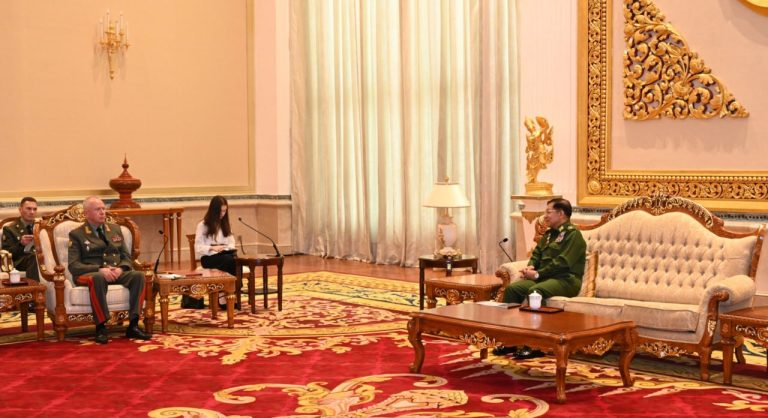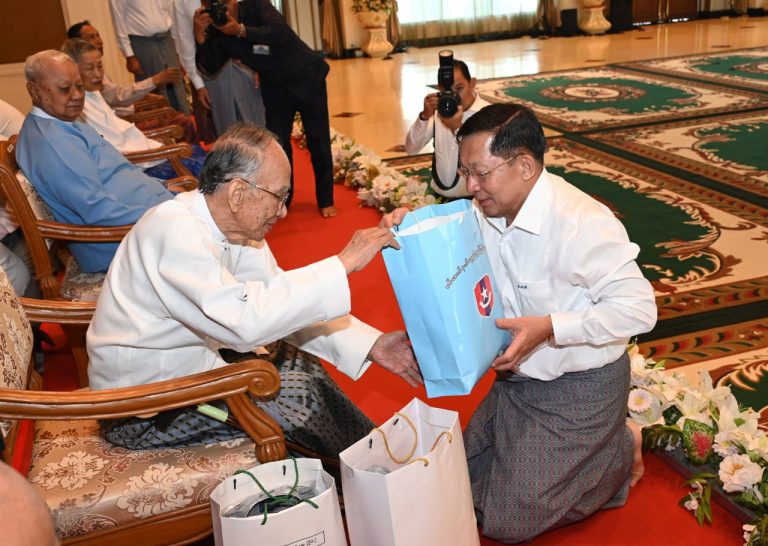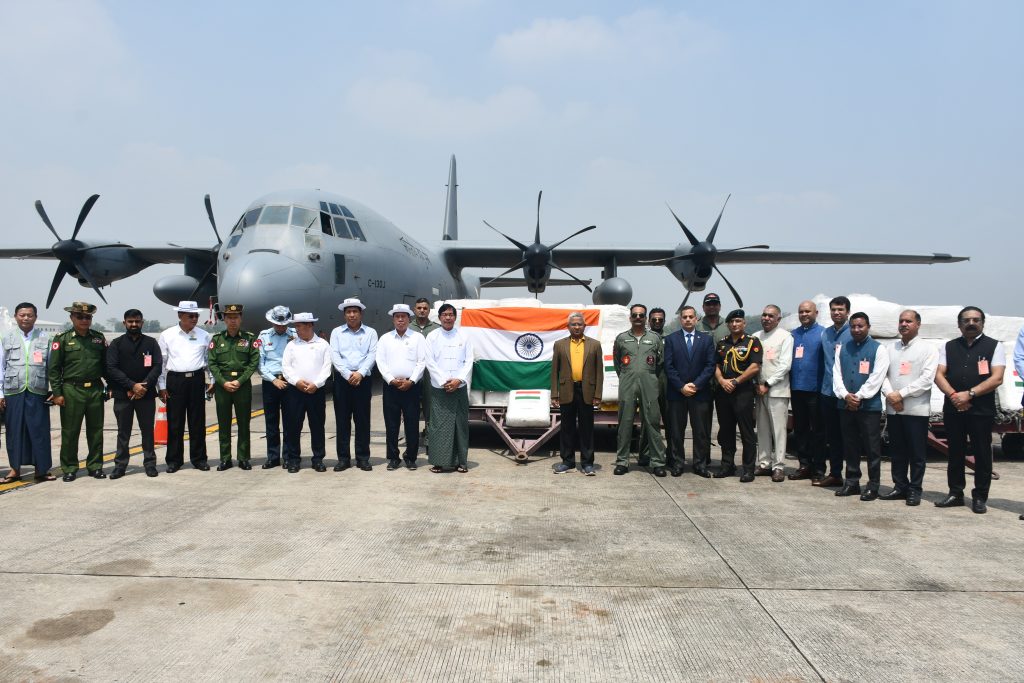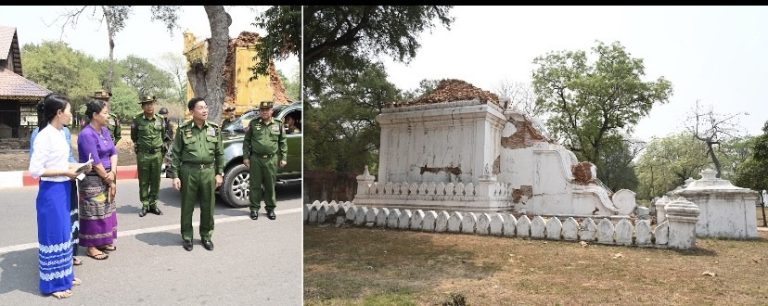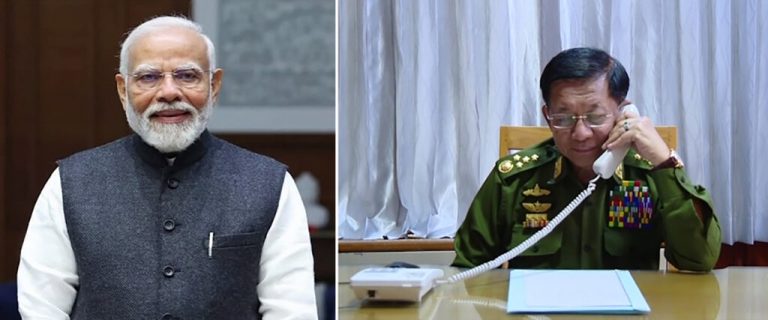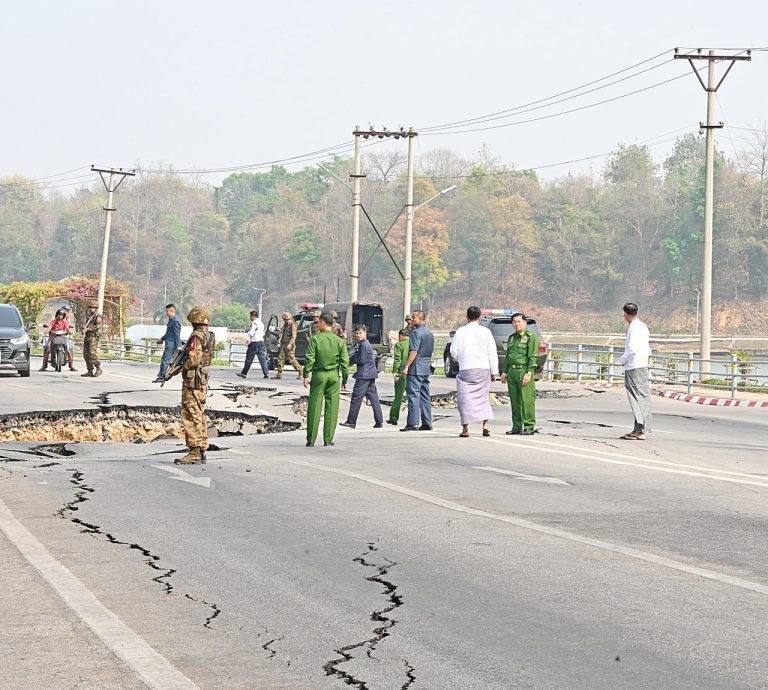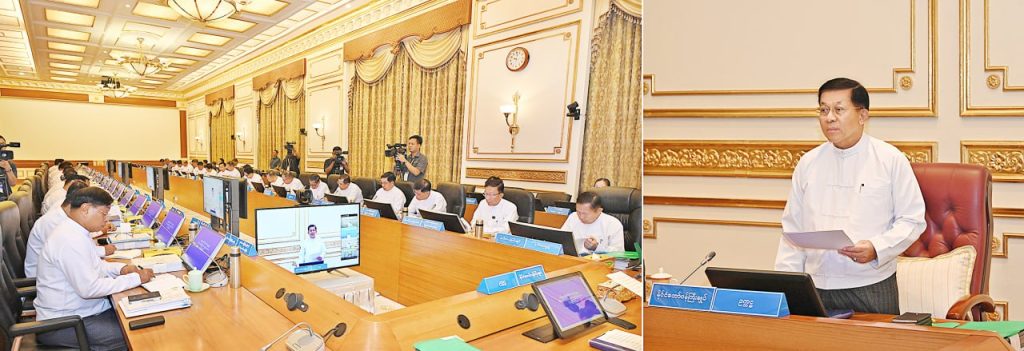
24 March 2025
The National Planning Commission (NPC) held a meeting at the meeting hall of the State Administration Council Chairman’s Office here this morning with an address by Chairman of NPC Chairman of State Administration Council Prime Minister Senior General Min Aung Hlaing.
Also present were Vice Chairman of NPC Vice Chairman of SAC Deputy Prime Minister Vice-Senior General Soe Win, union minister members of NPC, union level dignitaries, the Nay Pyi Taw Council chair and deputy ministers. Region/state chief ministers and chairmen of leading bodies of self-administered zone/division took part in the meeting in the form of video-conferencing.
In his address, the Senior General said union ministers, the union auditor-general, the Nay Pyi Taw Council chair, region/ state chief ministers would have to pass the National Planning Law for financial year 2025-2026 at this NPC meeting 1/2025.
Obviously, SAC has been exerting all-out efforts to realize the two national goals national prosperity and food sufficiency for national progress since its assumption of the duties.
The task of realizing the main business of the national economy calls for a robust institutional framework. In this regard, Agricultural Development Commission, Industrial Development Commission and Electricity and Energy Development Commission were set up to increase production of the country’s main sectors with accelerated momentum and the said sectors must enhance their own development pace.
The State is providing extra impetus for a strong economic growth, but the country is facing a loss of economic and social infrastructures including roads, bridges, towers, power stations, schools, hospitals due to destructive acts. As the saying goes, “increase of deer population is denied by the presence of a tiger”, the said acts are obstructing national development.
As development undertakings cannot be carried out in the areas where stability is absent, they lack behind in development. The State is providing all the required support for setting up a favourable economic environment.
Additionally, it is encouraging human resources development and ensuring a better socioeconomic environment, the main drive for promoting the production power of a country.
It is also extending the higher institutions of polytechnic learning in many parts of the country, in addition to Nay Pyi Taw, and ensuring accessible quality education for all.
It is upgrading healthcare services and in the social sector, it is engaging in the life-quality improvement of outstanding athletes to bring honour to the nation through sports.
The government has implemented its first-phase of the program covering the work of building indoor stadiums, and stands and a 400-metre track, and swimming pools in nearly all the regions and states. It is now in the process of implementing the second-phase of the program in district towns. In the thirdphase, it will build the facilities in townships.
As for environmental conservation, it is extending the monsoon tree planting activities and forest plantations. It is arranging the application of modern technology in search and rescue operations to alleviate the damage caused by climate change. Its tree plantation goal is “thriving of every planted tree”, and a target is set to increase forest cover of the country from 42 percent at present to 50 percent.
The fundamental transportation infrastructure, encompassing roads, production routes, inter-village roads, and allseason road networks in rural areas, has been developed to facilitate the movement of goods and passengers across various regions, including remote areas.
In the upcoming fiscal year 2025-2026, priority will be given to essential inputs, including seeds, fertilizers, machinery, and solar water pumping projects, to enhance agricultural and farming activities. These efforts will support the continuation of ongoing dam and electricity generation projects and contribute to the achievement of national development goals. Expenditures for vocational training and job creation will also be allowed.
To improve the standard of living for people with limited financial resources, the construction of public rental housing projects has been approved.
Additionally, the development of staff housing, essential for providing comfortable living conditions for employees in sectors such as security, education, health, and others, has also been permitted. Funds have been allocated to support and assist in the rehabilitation of people displaced by the violence.
A systematic study and analysis must be conducted on projects proposed by the Union Ministries, as well as those planned by regional and state governments, to ensure they are practical initiatives that will effectively benefit the people and are completed within the established timelines.
To achieve the nation’s aspirations and goals, relevant departments, organizations, regions, and states must follow the established agendas, directions, and policy objectives as guidelines, working together in a balanced and coordinated manner.
The State will continue to collaborate with the public to implement people-centered projects aimed at ensuring peace and prosperity for the Union, as well as prosperity for the nation’s citizens. Therefore, I urge all involved to work towards the successful execution of the targeted projects.
In his speech, the Vice-Senior General stated that the National Plan for the fiscal year 2025-2026, which is set to be approved at today’s National Planning Commission meeting, has been drawn up with the goal of enhancing the socio-economic well-being of the people and achieving people-centered, inclusive longterm development for the country’s prosperity and food security.
It was also noted that the plan is designed to be implemented in alignment with the country’s future plans and objectives, which include the development of agriculture and farming, micro, small, and medium-sized enterprises, increased exports, domestic edible oil self-sufficiency, and advancements in the education, health, transportation, electricity, and energy sectors. In addition, approval has been granted to undertake regional reconstruction and development efforts.
By the end of this fiscal year, growth is anticipated in all sectors except for the energy, metals, minerals, and electricity sectors.
According to the provisional year-end estimate, the economic growth rate is expected to reach 2.9 percent compared to the same period last year.
Based on this year’s implementation status, as well as the production and budget projections from relevant Union Ministries and regions/states, the GDP growth rate for the fiscal year 2025-2026 is estimated to reach 3 percent, valued at Ks-171,498.1 billion at the prices of the year. Based on the 2024 Population and Housing Census and the preliminary population estimates, with a population of 51.3 million, the per capita production and service value is projected to exceed 3.3 million.
He urged the meeting to ensure that project expenditures linked to production and service activities are spent systematically, working together to achieve greater economic growth than currently, effectively utilizing the state’s resources to achieve positive results, and meeting the main and basic needs of the people.
Following this, U Win Shein, Vice Chairman of the National Planning Commission, Deputy Prime Minister, and Union Minister for Planning and Finance, reviewed and discussed the implementation status of the National Plan for the 2024-2025 fiscal year and provided an overview of the draft National Plan for the 2025-2026 fiscal year.
Then, Secretary of the National Planning Commission Deputy Minister for Planning and Finance Daw Than Than Lin reported to the Senior General on the draft of the 2025-2026 Fiscal Year National Planning Law (Draft).
Afterward, union ministers reported to the Senior General on planning targets and implementation for each fiscal year.
After hearing the reports the Senior General made additional remarks, saying plans are developed to implement what can actually be implemented and it is necessary to develop plans that will mainly serve the people. It is important to increase the GDP of the country by boosting domestic production and to enhance the manufacturing sector by using agricultural products. If the manufacturing sector makes progress, other industrial and services sectors will develop. Therefore, concerted efforts must be made for the development of the manufacturing sector.
It is necessary for all to strive for the success of national plans seriously. In developing plans, it is important to take urban and rural populations into consideration. It is vital to take food for people living in rural and urban areas into account. As sufficient meat and fish must be produced, the government has been encouraging the livestock breeding sector effectively. The agriculture sector is also being encouraged.
In connection with plans, relevant organizations must take measures for regional security.
Investment will increase when security is ensured. As foreign investment has dropped, it is necessary to boost production. Therefore, regions and states are required to make efforts to boost production seriously.
As regards GDP, regions and states are required to strive to meet the targets in agriculture and livestock breeding and meat and fish sectors while it is necessary for ministries to supervise the tasks and to implement plans practically and successfully.
In connection with security and the rule of law, regions and states are required to take security measures properly to hold a multi-party general election in December. If security can be ensured, domestic and foreign investments will increase and it is necessary for all to make concerted efforts for the success of national plans.
Then, the Senior General made concluding remarks, saying efforts must be made to meet GDP targets so that the economy of a country will be strong.
Therefore, it is necessary to take practical measures to meet intended targets in national and regional plans. Tasks being carried out by the government, which implements national interests by prioritizing national affairs, must be transparent and beneficial for the people. All the tasks must be able to meet their criteria.
Union ministries, Nay Pyi Taw Council and regional and state governments are required to coordinate the tasks that must be carried out before the 2025-2026 Fiscal Year National Planning Law and regional planning laws are enacted.
It is necessary to bravely take appropriate measures to boost the political, economic and defence strengths of the country. In implementing plans, lessons must be learnt and pragmatic measures must be taken innovatively.
It is necessary to supervise the National Economic Promotion Fund to ensure that it is spent effectively in respective states and regions without wastage. As sound foundations for development of MSMEs have been laid, continued efforts must be made for long-term operation of them and to link them with the global manufacturing network through regional manufacturing networks.
Domestic manufacturing industries are required to enhance their import-substitutes production capabilities to reduce foreign exchange spending. In conclusion, the Senior General urged regions and states including Nay Pyi Taw to take stricter measures to prevent illegal exploitation and trading of natural resources. After the remarks, the meeting concluded.

